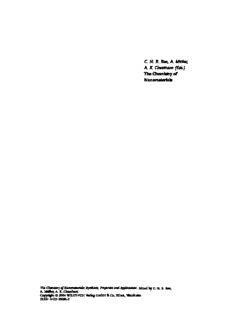
CNR Rao, A. Müller, AK Cheetham PDF
Preview CNR Rao, A. Müller, AK Cheetham
C.N.R.Rao,A.Mu¨ller, A.K.Cheetham(Eds.) TheChemistryof Nanomaterials TheChemistryofNanomaterials:Synthesis,PropertiesandApplications.EditedbyC.N.R.Rao, A.Mu¨ller,A.K.Cheetham Copyright82004WILEY-VCHVerlagGmbH&Co.KGaA,Weinheim ISBN:3-527-30686-2 Further Titles of Interest G.Schmid(Ed.) Nanoparticles FromTheorytoApplication 2004 ISBN3-527-30507-6 V.Balzani,A.Credi,M.Venturi Molecular Devices and Machines AJourneyintotheNanoworld 2003 ISBN3-527-30506-8 M.Driess,H.No€th(Eds.) Molecular Clusters of the Main Group Elements 2004 ISBN3-527-30654-4 G.Hodes(Ed.) Electrochemistry of Nanomaterials 2001 ISBN3-527-29836-3 U.Schubert,N.Hu€sing Synthesis of Inorganic Materials 2000 ISBN3-527-29550-X C. N. R. Rao, A. Mu¨ller, A. K. Cheetham (Eds.) The Chemistry of Nanomaterials Synthesis, Properties and Applications in 2 Volumes Volume 1 Prof.Dr.C.N.R.Rao 9 Thisbookwascarefullyproduced. CSIRCentreofExcellenceinChemistry Nevertheless,authors,editorsandpublisher andChemistryandPhysicsofMaterials donotwarranttheinformationcontained Unit thereintobefreeoferrors.Readersare JawaharlalNehruCentreforAdvanced advisedtokeepinmindthatstatements, ScientificResearch data,illustrations,proceduraldetailsor JakkurP.O. otheritemsmayinadvertentlybe Bangalore–560064 inaccurate. India LibraryofCongressCardNo.:appliedfor Prof.Dr.h.c.mult.AchimMu¨ller Acataloguerecordforthisbookisavailable FacultyofChemistry fromtheBritishLibrary. UniversityofBielefeld BibliographicinformationpublishedbyDie Postfach100131 DeutscheBibliothek D-33501Bielefeld DieDeutscheBibliothekliststhis Germany publicationintheDeutscheNational- bibliografie;detailedbibliographicdatais Prof.Dr.A.K.Cheetham availableintheInternetathttp://dnb.ddb.de Director MaterialsResearchLaboratory (2004WILEY-VCHVerlagGmbH&Co. UniversityofCalifornia,SantaBarbara KgaA,Weinheim SantaBarbara,CA93106 Allrightsreserved(includingthoseof USA translationinotherlanguages).Nopartof thisbookmaybereproducedinanyform– byphotoprinting,microfilm,oranyother means–nortransmittedortranslatedinto machinelanguagewithoutwritten permissionfromthepublishers.Registered names,trademarks,etc.usedinthisbook, evenwhennotspecificallymarkedassuch, arenottobeconsideredunprotectedbylaw. PrintedintheFederalRepublicof Germany. Printedonacid-freepaper. Composition AscoTypesetters,HongKong Printing betz-druckgmbh,Darmstadt ¨ Bookbinding J.SchafferGmbH&Co.KG, ¨ Grunstadt ISBN 3-527-30686-2 v Contents Preface xvi ListofContributors xviii Volume1 1 Nanomaterials–AnIntroduction 1 C.N.R.Rao,A.Mu¨ller,andA.K.Cheetham 1.1 SizeEffects 3 1.2 SynthesisandAssembly 4 1.3 Techniques 5 1.4 ApplicationsandTechnologyDevelopment 8 1.5 Nanoelectronics 8 1.6 OtherAspects 9 1.7 ConcludingRemarks 11 Bibliography 11 2 StrategiesfortheScalableSynthesisofQuantumDotsand RelatedNanodimensionalMaterials 12 P.O’BrienandN.Pickett 2.1 Introduction 12 2.2 DefiningNanodimensionalMaterials 13 2.3 PotentialUsesforNanodimensionalMaterials 15 2.4 TheGeneralMethodsAvailablefortheSynthesisofNanodimensional Materials 17 2.4.1 PrecipitativeMethods 19 2.4.2 ReactiveMethodsinHighBoilingPointSolvents 20 2.4.3 HydrothermalandSolvothermalMethods 22 2.4.4 Gas-PhaseSynthesisofSemiconductorNanoparticles 23 2.4.5 SynthesisinaStructuredMedium 24 2.5 TheSuitabilityofSuchMethodsforScaling 25 2.6 ConclusionsandPerspectivesontheFuture 26 Acknowledgements 27 References 27 TheChemistryofNanomaterials:Synthesis,PropertiesandApplications.EditedbyC.N.R.Rao, A.Mu¨ller,A.K.Cheetham Copyright82004WILEY-VCHVerlagGmbH&Co.KGaA,Weinheim ISBN:3-527-30686-2 vi Contents 3 MovingNanoparticlesAround:Phase-TransferProcessesinNanomaterials Synthesis 31 M.Sastry 3.1 Introduction 31 3.2 Water-BasedGoldNanoparticleSynthesis 33 3.2.1 Advantages 33 3.2.2 Disadvantages 33 3.3 OrganicSolution-BasedSynthesisofGoldNanoparticles 33 3.3.1 Advantages 33 3.3.2 Disadvantages 34 3.4 MovingGoldNanoparticlesAround 34 3.4.1 PhaseTransferofAqueousGoldNanoparticlestoNon-PolarOrganic Solvents 34 3.4.2 TransferofOrganicallySolubleGoldNanoparticlestoWater 43 Acknowledgments 48 References 49 4 MesoscopicAssemblyandOtherPropertiesofMetalandSemiconductor Nanocrystals 51 G.U.Kulkarni,P.J.Thomas,andC.N.R.Rao Abstract 51 4.1 Introduction 51 4.2 SyntheticStrategies 53 4.2.1 GeneralMethods 53 4.2.2 SizeControl 55 4.2.3 ShapeControl 57 4.2.4 TailoringtheLigandShell 58 4.3 ProgrammedAssemblies 61 4.3.1 One-DimensionalArrangements 61 4.3.2 Two-DimensionalArrays 62 4.3.2.1 ArraysofMetalNanocrystals 63 4.3.2.2 ArraysofSemiconductorNanocrystals 65 4.3.2.3 ArraysofOxideNanocrystals 66 4.3.2.4 OtherTwo-DimensionalArrangements 68 4.3.2.5 StabilityandPhaseBehaviourofTwo-DimensionalArrays 68 4.3.3 Three-DimensionalSuperlattices 71 4.3.4 Superclusters 73 4.3.5 ColloidalCrystals 75 4.3.6 NanocrystalPatterning 75 4.4 EmergingApplications 77 4.4.1 IsolatedNanocrystals 78 4.4.2 CollectiveProperties 82 4.4.3 Nanocomputing 86 4.5 Conclusions 86 References 88 Contents vii 5 OxideNanoparticles 94 R.Seshadri Abstract 94 5.1 Introduction 94 5.2 MagnetiteParticlesinNature 96 5.3 RoutesforthePreparationofIsolatedOxideNanoparticles 98 5.3.1 Hydrolysis 98 5.3.2 Oxidation 101 5.3.3 Thermolysis 102 5.3.4 Metathesis 103 5.3.5 SolvothermalMethods 105 5.3.5.1 Oxidation 105 5.3.5.2 Hydrolysis 105 5.3.5.3 Thermolysis 106 5.4 Prospects 108 Acknowledgments 110 References 110 6 SonochemistryandOtherNovelMethodsDevelopedfortheSynthesisof Nanoparticles 113 Y.MastaiandA.Gedanken Abstract 113 6.1 Sonochemistry 113 6.1.1 SonochemicalFabricationofNanometals 116 6.1.1.1 SonochemicalSynthesisofPowdersofMetallicNanoparticles 116 6.1.1.2 SonochemicalSynthesisofMetallicColloids 118 6.1.1.3 SonochemicalSynthesisofMetallicAlloys 120 6.1.1.4 SonochemicalDepositionofNanoparticlesonSphericalandFlat Surfaces 121 6.1.1.5 SonochemicalSynthesisofaPolymer-MetalComposite 124 6.1.1.6 SonochemicalSynthesisofNanometalsEncapsulatedinaCarbon Matrix 127 6.1.2 SonochemicalFabricationofNano-MetallicOxides 129 6.1.2.1 SonochemicalSynthesisofTransitionMetalOxidesfromthe CorrespondingCarbonyls 129 6.1.2.2 SonochemicalSynthesisofFerritesfromtheCorresponding Carbonyls 131 6.1.2.3 SonochemicalPreparationofNanosizedRare-EarthOxides 133 6.1.2.4 TheSonohydrolysisofGroup3ACompounds 134 6.1.2.5 TheSonochemicalSynthesisofNanostructuredSnO andSnOastheir 2 UseasElectrodeMaterials 136 6.1.2.6 TheSonochemicalSynthesisofMesoporousMaterialsandtheInsertion ofNanoparticlesintotheMesoporesbyUltrasoundRadiation 137 6.1.2.7 TheSonochemicalSynthesisofMixedOxides 143 6.1.2.8 TheSonochemicalSynthesisofNanosizedHydroxides 143 viii Contents 6.1.2.9 SonochemicalPreparationofNanosizedTitania 144 6.1.2.10 TheSonochemicalPreparationofOtherOxides 145 6.1.2.11 SonochemicalSynthesisofOtherNanomaterials 147 6.2 Sonoelectrochemistry 148 6.2.1 SonoelectrochemicalSynthesisofNanocrystallineMaterials 149 6.3 MicrowaveHeating 152 6.3.1 MicrowaveSynthesisofNanomaterials 155 6.3.1.1 MicrowaveSynthesisofNanometallicParticles 155 6.3.1.2 TheSynthesisofNanoparticlesofMetalOxidesbyMWH 157 Acknowledgements 163 References 164 7 SolvothermalSynthesisofNon-OxideNanomaterials 170 Y.T.Qian,Y.L.Gu,andJ.Lu 7.1 Introduction 170 7.2 SolvothermalSynthesisofIII–VNanomaterials 175 7.3 SynthesisofDiamond,CarbonNanotubesandCarbides 181 7.4 SynthesisofSi3N4,P3N5,MetalNitridesandPhosphides 186 7.5 SynthesisofBN,B4C,BPandBorides 189 7.6 SynthesisofOne-DimensionalMetalChalcogenideNanocrystallites 193 7.7 RoomTemperatureSynthesisofNanomaterials 198 References 204 8 NanotubesandNanowires 208 A.GovindarajandC.N.R.Rao Abstract 208 8.1 Introduction 208 8.2 CarbonNanotubes 210 8.2.1 Synthesis 210 8.2.1.1 Multi-WalledNanotubes 210 8.2.1.2 AlignedCarbonNanotubeBundles 212 8.2.1.3 Single-WalledCarbonNanotubes 214 8.2.2 StructureandCharacterization 217 8.2.3 MechanismofFormation 222 8.2.4 ChemicallyModifiedCarbonNanotubes 224 8.2.4.1 DopingwithBoronandNitrogen 224 8.2.4.2 Opening,FillingandFunctionalizingNanotubes 225 8.2.5 ElectronicStructure,PropertiesandDevices 227 8.2.5.1 ElectronicStructureandProperties 227 8.2.5.2 ElectronicandElectrochemicalDevices 228 8.3 InorganicNanotubes 239 8.3.1 Preliminaries 239 8.3.2 GeneralSyntheticStrategies 244 8.3.3 Structures 246 8.3.4 UsefulPropertiesofInorganicNanotubes 253 Contents ix 8.4 Nanowires 255 8.4.1 Preliminaries 255 8.4.2 SyntheticStrategies 255 8.4.2.1 VaporPhaseGrowthofNanowires 256 8.4.2.2 OtherProcessesintheGasPhase 262 8.4.2.3 Solution-BasedGrowthofNanowires 265 8.4.2.4 GrowthControl 273 8.4.3 PropertiesofNanowires 274 References 275 9 Synthesis,AssemblyandReactivityofMetallicNanorods 285 C.J.Murphy,N.R.Jana,L.A.Gearheart,S.O.Obare,K.K.Caswell, S.Mann,C.J.Johnson,S.A.Davis,E.Dujardin,andK.J.Edler 9.1 Introduction 285 9.2 Seed-MediatedGrowthApproachtotheSynthesisofInorganicNanorods andNanowires 287 9.3 AssemblyofMetallicNanorods:Self-Assemblyvs.DesignedChemical Linkages 293 9.4 ReactivityofMetallicNanoparticlesDependsonAspectRatio 299 9.5 ConclusionsandFutureProspects 304 Acknowledgements 306 References 306 10 Oxide-AssistedGrowthofSiliconandRelatedNanowires: GrowthMechanism,StructureandProperties 308 S.T.Lee,R.Q.Zhang,andY.Lifshitz Abstract 308 10.1 Introduction 309 10.2 Oxide-AssistedNanowireGrowth 311 10.2.1 DiscoveryofOxide-AssistedGrowth 311 10.2.2 Oxide-AssistedNucleationMechanism 314 10.2.3 Oxide-AssistedGrowthMechanism 316 10.2.4 ComparisonbetweenMetalCatalystVLSGrowthandOAG 317 10.3 ControlofSiNWNanostructuresinOAG 319 10.3.1 MorphologyControlbySubstrateTemperature 319 10.3.2 DiameterControlofNanowires 326 10.3.3 Large-AreaAlignedandLongSiNWsviaFlowControl 328 10.3.4 SiNanoribbons 330 10.4 NanowiresofSiCompoundsbyMultistepOxide-AssistedSynthesis 332 10.4.1 Nanocables 332 10.4.2 MetalSilicide/SiNWsfromMetalVaporVacuumArcImplantation 333 10.4.3 SynthesisofOrientedSiCNanowires 334 10.5 ImplementationofOAGtoDifferentSemiconductingMaterials 335 10.6 ChemicalPropertiesofSiNWs 340 10.6.1 StabilityofH-TerminatedSiNWSurfaces 340 x Contents 10.6.2 ReductionofMetalsinLiquidSolutions 343 10.6.3 ChemicalSensingofSiNWs 345 10.6.4 UseofSiNWsasTemplatesforNanomaterialGrowth 346 10.7 OpticalandElectricalPropertiesofSiNWs 347 10.7.1 RamanandPLofSiNWs 347 10.7.2 FieldEmissionfromDifferentSi-BasedNanostructures 350 10.7.3 STMandSTSMeasurementsofSiNWsandB-DopedSiNWs 351 10.7.4 PeriodicArrayofSiNWHeterojunctions 356 10.8 Modeling 359 10.8.1 HighReactivityofSiliconSuboxideVapor 359 10.8.2 ThermalandChemicalStabilitiesofPureSiliconNanostructured Materials 360 10.8.2.1 StructuralTransitioninSiliconNanostructures 360 10.8.2.2 ThinnestStableShortSiliconNanowires 361 10.8.2.3 SiliconNanotubes 361 10.8.3 ThermalandChemicalStabilitiesofHydrogenatedSilicon Nanostructures 363 10.8.3.1 StructuralPropertiesofHydrogenatedSiliconNanocrystalsand Nanoclusters 363 10.8.3.2 Size-DependentOxidationofHydrogenatedSiliconClusters 365 10.9 Summary 365 Acknowledgement 368 References 369 Volume2 11 ElectronicStructureandSpectroscopyofSemiconductorNanocrystals 371 S.SapraandD.D.Sarma 11.1 Introduction 371 11.2 StructuralTransformations 372 11.3 Ultraviolet–VisibleAbsorptionSpectroscopy 374 11.4 FluorescenceSpectroscopy 377 11.5 ElectronicStructureCalculations 383 11.5.1 EffectiveMassApproximation 384 11.5.2 EmpiricalPseudopotentialMethod 385 11.5.3 Tight-BindingMethod 387 11.6 PhotoemissionStudies 394 11.6.1 CoreLevelPhotoemission 395 11.6.2 ValenceBandPhotoemission 399 11.7 ConcludingRemarks 401 References 402 12 Core–ShellSemiconductorNanocrystalsforBiologicalLabeling 405 R.E.BaileyandS.Nie 12.1 Introduction 405
Description: